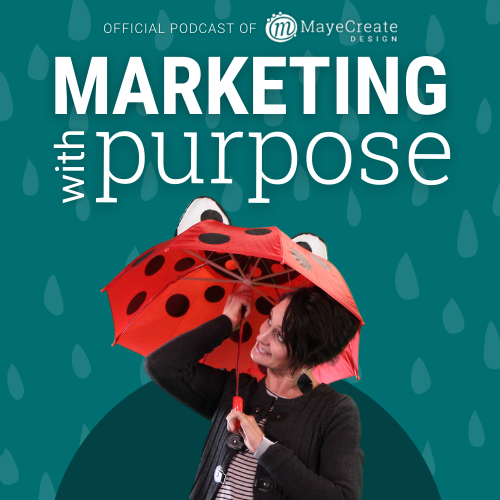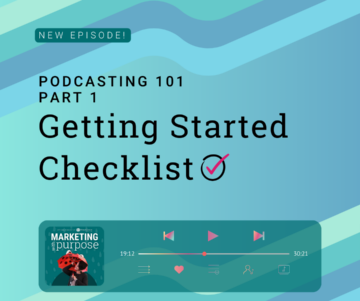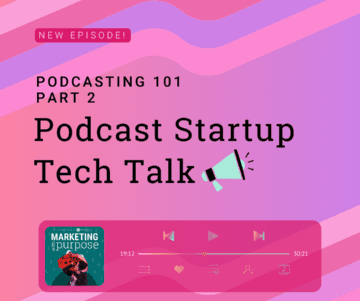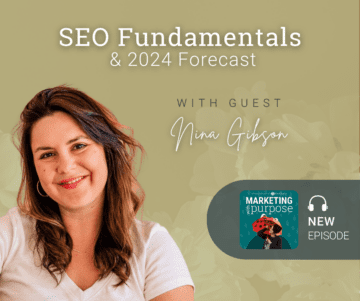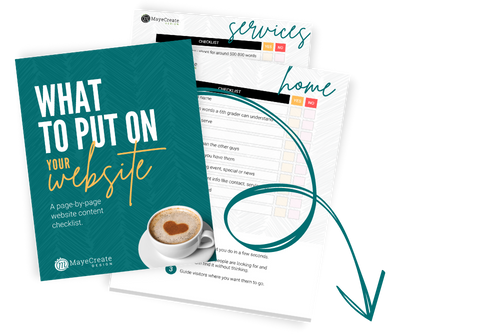How Google Ranks Sites #1
May 20, 2020

CONSUME CREATIVELY
This content is available in:
This content is available in:
AUDIO
TEXT
This episode is not for the SEO experts, it’s for SEO beginners. It’s for the people who want to have a big picture understanding of how SEO works and those who want to do a survey of their own site and see how it meets up to Google’s expectations. In this podcast, we are covering what SEO is, what it means, and if you need it, and then we break it down into five big components about how it works. Lastly, we will provide the tools so you can audit your own site and see how you stack up!
Transcription
Hello friends and welcome to marketing with purpose. This is Monica Pitts and today I’m going to talk about my friend of me Google and how he ranked sites. Number one.
Unknown Speaker 0:17
If you’re a natural-born marketer, you’re one lucky son of a gun. If you’re like most people, marketing, especially online marketing is about as appealing as standing in a police lineup. The mayecreate team of creatives is transformed websites and digital marketing from craptastic to fantastic since 2005. Our podcast marketing with purpose makes sense of marketing so you can make purposeful decisions instead of carrying on with the same old crap you’ve been doing. And now your host, Monica Pitts, founder of mayecreate with another episode on how to make your marketing not suck.
Monica Pitts 0:53
So this episode is not for the SEO experts. It’s for the SEO beginners. It’s for the people who want to have a big picture understanding of how it works, and maybe want to do a survey of your own site and how it meets up to Google’s expectations. So before I dive into the topic too deeply, I want to let you know that there is a worksheet that I made up that you can download that you can take notes on, but then also, it has a worksheet that breaks the items that I’m going to talk about into a check sheet so you can use the resources that I’m going to introduce to you to do a survey of your own site to guide you and you could also use it if you’re going to set up an new one as you know a checklist so go ahead and go out to resources.mayecreate.com and download that sheet. And you can also go to podcast.mayecreate.com to get the Show Notes for this episode and to see links to the downloadable resources or jump on over to the nicely formatted blog posts with all the visuals and everything put together in case you want to read all about it. So, back to business, how does Google rank sites number one, I’m going to introduce you to search engine optimization and tell you what it means we’re going to have a brief discussion about if you even need to worry about it or not. And then we’re going to talk about in-depth for most of the time how it works. So what does SEO mean? And it’s, it stands for search engine optimization. That’s what those three little letters mean, SEO, Search Engine Optimization. And what that is, is Google’s interpretation of the reputation and online health of your business. It’s the way that it judges whether you’re worthy of displaying on search results or not. Google’s search algorithm uses certain factors to decide how relevant you are to searchers. And then is how SEO is derived just through that algorithm. Now, people come into my office all the time, and they’re like, I need to rank number one, I really I needed to be number one and then sometimes yes, sometimes you do need to rank number one. And then there’s other times where that probably doesn’t need to be your main concern as the business. So SEO is not everybody’s top priority. Now, one thing that should always happen is you should always show up when someone searches for your name. If your website does not show up when someone searches for your business name, something went like bad wrong somewhere along the way. And it just, that’s how it works. It’s a very specific search term your business name is and so if you’re not showing up when people search for your name, something has went wrong and it needs to be fixed. That should always happen for every business. Now, if you serve the general public and you want more business, you should certainly be concerned about how your site ranks on Google. That’s a yes, you should not be concerned about how your site ranks on Google, other than for your name if you only work on government contracts because that’s not how you get business. You get business through making relationships with the government, it might be low bid work, whatever it is. It’s not the same as the general public searching for your services and your website showing up. You might need to be concerned about it, if part of your workload is derived through working with other businesses, and you want to grow that part of your business. So for the most part, I think that people should be somewhat concerned with search engine optimization and making sure that their website shows up on Google. But not everybody needs to dedicate three quarters of their marketing budget to this activity. That being said, I mean, how does it work? Google looks at a handful of things to determine if you’re legit, and I’ve broken them into five main categories for consumption today, every two years Moz, which is an ad. They are a search engine optimization application company that helps make optimizing your website easier. They do a survey of hundreds of leading search marketing experts in which they asked their opinions on over 90 ranking factors. Now the data that I’m going to use today is derived from the 2018 survey because there is not a new survey out yet for 2020. And while the meter is certainly always moving, one way or another, the five factors that I am going to talk about today, they’ve been top ranking factors for many years. They’re not going anywhere. They just slide around and kind of jockey for position on who’s more important.
Those five factors that we’ll cover today are a technically sound website, your website content and behavior, listings, link building, and social media.
Now all of these factors are relative, their relative, and adjust based on each industry based on the competition for a given location. They adjust based on where your searcher is located. And so, as you’re trying to figure out what your optimization strategy is for your website, the most basic piece of advice I can give you is do a SWOT analysis and figure out what the other guy is doing or not doing and then do more of that or do it better. Now, these five things that I just listed a technically sound website, your website content and behavior, listings, link building, and social media. They break down into smaller groups. And I am going to go over those many things. So we can sort through them one at a time to really understand how it works. So first up is a technically sound website. It’s really difficult to get any of these other things to work without having a technically sound website. The technical, it’s so there’s lots of parts to a website, they all feel easy until someone looks at you and tells you to take photos for every single page and write a 20-page paper to promote your company to the world. But the technical components are for the most part, the things that you can’t see. Things that if you’re new, or you’ve been doing it even for 20 years, you have to pay attention to because they are for ever-evolving that quality and up to date code. Because code is ever-changing. We used to build websites and tables, and now everything’s in divs. I mean, it, don’t build it in tables. That’s not how it’s read anymore. It needs to be mobile-friendly, and we’ll go over that more in depth in another episode. Basically, Google’s gonna look at your mobile website first before it looks at your desktop website. So making sure that you have a mobile website is a must. Your URL structure has to be correct to be able to be found. Your internal link architecture needs to be right. It needs to load quickly because of many things, but one thing we’ll explore in the next item is that people have to stay on your website. If your website doesn’t load quickly, then they won’t stay there at all. Or they won’t wait for it to load, they’ll just leave. You have to have your Sitemaps they have to be submitted to Google so it understands what’s going on on your website. And it can index every page as you add it. And then you also need to have proper redirects, things can’t just be redirecting all over the place. It takes a long time to load. And it’s confusing to Google. And we are going to spend so much time talking about these individual components and other episodes that I’m not going to give you step by step instructions on what they are. All are right now. But we do need to understand that these are the things we have to do to appease the Google Gods. Now, unfortunately, your website now lasts less time than it ever did before. And Stacy and I recently did an episode on how to extend the life of your website, which is a bit over, you know, 101 SEO, but it does explain what you can do to make your website last longer. And it’s a great lesson if you’re interested. So I used to say that a website would last seven to 10 years, and then it’s shrunk down to like three to eight years and at this point, without some really good revamping, you’d be happy to get like three to six years out of your site. I like to tell people to expect some decent improvements year three, so you’re going to set aside some budget year three to make some good improvements. It might be that you need to upgrade functionality because things have changed online so much or that aesthetically your site is starting to look dated in comparison to your competitors, but your website is not one and done. And you need a budget to understand that it is a continual evolving beast. If you want to take a look at what is going on with your website, you can use one of these three reports. The first one is websitegrader.com. It gives you a big picture overview of your site health. And, and it’s really easy to understand it’s all written in terms that you know, a general person can understand. Then if you’re trying to diagnose how to make it better, you would probably jump on over to something like gtmetrics.com which gives you a deep dive of your site load speed and all the things that are happening and what you can do to make it better. Then you can also if you really have no idea what your site is even built with or what’s going on in it at all. You can go out to buildwith.com and it will tell you what any site is using to power it, which is kind of creepy, but really cool all at the same time. Those are three tools that you can use in your toolbox to understand how your website is if it’s technically sound and if it’s loading quickly for visitors. Next up on our pie is website content and behavior. So this breaks down to 44 and a half percent of the SEO pie. So that’s a big old chunk of the SEO pie. And I find it interesting that each of these items is separated because in my mind, they all meet the same end goal. get people to click on your site listing and stay on your page to learn about your business. So 7% is like hey, be authentic, and don’t be a total goober that no one everyone wants to meet. But 11 and a half percent of your pie is about how people interact with your site. If they just go And leave because it takes forever to load or because the content isn’t what you said it would be or because you seem just completely lame, that’s a total strike against you. So it makes sense that personalizing your content would reach that same end goal, which feeds into the next 26%. Because if you’re trying to rig the system, and your site shows up for a search term that no one ever clicks on, then Google thinks your site probably isn’t relevant to the searcher. So it’s like all tied together and you need a good site with stuff on it that makes people want to stick around and get to know you. And you have to set it all up the right way so that Google would find it to begin with and send people there so it feels very tied together.
But even if you go out tomorrow and create a website for yourself, you do everything right. It still takes time to show up. And that’s what that domain authority in that 26% is talking about. So, for example, a lot of the times when we build websites at mayecreate, the new website will show up underneath the mayecreate site when you search for our clients company name, because we will publish an article in our portfolio about how we built this website and how cool this company is. And our website has been around for 15 years, but their website just started yesterday. So for a while mayecreates website will be shown over the client’s website because our domain authority is so much stronger than theirs. And Google likes to group content together. It makes assumptions about what you want to know and it serves you search results based on those assumptions. So that’s why if you search for gluten free pizza, you get recipes except for the dominoes add that shows up at the top but they do have really pretty good gluten free pizza as a gluten free lady, I can tell you that from experience, and at a reasonable price too. But then if you search for pizza, then you get restaurants. But you know, when I search for gluten free pizza, there is a local pizza company who snuck into those recipe results. They show up above the recipe results and they did it because they
added a page to their website about gluten free pizza crust, which is awesome. Because each piece of content that you add to your website is like a door. The more doors that you have on your site, the more ways visitors can enter. So without that page about gluten free pizza crust, they wouldn’t have a result in this search. And the more pages that you have talking about what you do, the more ways you can welcome in those visitors. You talk about what you do in a certain way, but not everybody talks about it that way. And that’s why blogging can be so successful to drive traffic to your site. It catches people where they are using the real language that they use at that point in their buying cycle. It’s like magic. And I have like a whole podcast about the magic of blogging. But ultimately, you also need to have a page for each service on your website as well. Because if you are a landscaping company, and you do landscaping, and that’s and you think, oh, well, everything is just landscaping, when in actuality one of your services is lawn mowing, people might not search for lawn mowing as landscaping. They might not associate that a landscaping company does lawn mowing so you might never show up in the search results if you don’t have a page dedicated to lawn mowing. Great example here. I had a client who built custom homes. The whole website was all about custom homes. That’s all we talked about on the entire website. And then two years later, he came to me and was like, this website’s a pile of crap. Nobody can find me for remodeling. And I’m like, well, you never said anything about remodeling on the whole site. So of course, they never found you about remodeling. You never drew that picture for Google. Google is literal. It’s an algorithm. It can make some choices in that gray area, but it is not, at some lines, not making decisions, right. So it’s a robot, we have to be literal, we have to give it to Google if we want Google to find it. So of course, his website isn’t showing up for remodeling. It only shows up for custom homes because that’s the only thing on there. And if Shakespeare’s pizza had not made a page all about their gluten free crust, it would not show up on the search results when you search for gluten free pizza. So the next time piece is your listings in this SEO pie. Now one of my favorite stories to tell is about a fence company with incorrect Google listings. And let me see if I can tell it like super quickly. So I needed a fence last year, like a huge fan of $10,000 fence. And people told me to call this one company who did not have a website, but they had a handful of listings and every phone number they had was wrong on all of their listings, so they lost out on my business. And that would never have happened back in the days of the Yellow Pages because your listing was always correct because you paid for it. Now they’re free and our businesses info is just like plastered everywhere. We don’t even know if it’s wrong or not. I mean, oh, yeah. So we need to have our business listings properly formatted they all need to be exactly correct. The correct category, we need to have our names exactly the same spelled the same way down to like, are you gonna, you know, abbreviate road in your address, or are you going to spell it out every single time does it have a capital letter or not? Because Google is looking at these listings, and it’s deriving from the consistency of them whether you’re legitimate or not. So let’s say that you moved, you are a person that needs to be concerned about this because your business move locations. And now there is inconsistent listing information all over the place. There’s services that will take care of that for you and especially if you move it probably just makes sense to like, pay somebody to do it for you for around and then kind of leave it alone. But just know that Google is going to judge you if you have information in one place that doesn’t match up with everything else. So that’s like 14% of your pie 14%. then 9% is just having a proper Google business listing. And your Google business listing is super important because Google is waiting all of that on you. Which means do you have the keyword in the business title? Are you in the correct category? And the easiest way to figure this stuff out is just to Google your competition, figure out what category they’re in, and then see how you stack up. Make sure that the pictures in your listing are like reflective of your business. We have one guy who I googled for his business, and his Google business listing has pictures of pineapples on it, and he is an asphalt paving company, which I think is hilarious, right? But that’s the kind of stuff that is not right. And it’s out there and we just don’t know it.
So then 8% is your online reviews. The quantity of the reviews and the quality of the reviews like are they one line or are they authentic, and then where they are. So a review on Facebook or Yelp or Google is worth far more than on some random website or maybe on your own website, like a testimonial is not the same thing as a review. So that’s 8% of the pie. If you want to know where your site is listed, you can go out to addsolutions.wp.com, the Yellow Pages, yes. How awesome is that? I use them in my example. And this is a resource that I give you. But it’ll tell you all the places that your site is listed. And then it’ll also tell you if there’s any inconsistency between the listing and you’ll be so surprised. It’s pretty painful, actually. Not very picky about it. But yeah, and this gives you a place to start in correcting them. So the second the last piece of the pie that I’m going to talk with you about today is link building that is 28% of this pie. And inbound links have always been a really big deal. It’s not going anywhere. It’s like how many people do you know that know the name of your company that would refer business to your company? The more people you know, the cooler you are. And each link is like a person, you know, telling Google that you’re cool and that your content is worth linking to. Now, if it’s just on a bunch of random websites that have nothing to do with you, then it’s not worth nearly as much as if it’s coming from a reputable website. If you go out to Moz/researchtools/tools/ o s, e, it will tell you what’s linking to your site, it’ll give you a whole list. And if you want to be real sneaky, like if you’re like me, and like, all web design companies, link to their own website, you know, website designed by from the bottom of every website that they build. And so since we all do it, I can go out and I can search for my competition’s website in this tool, and it gives me a list of all of the websites that are linking to them. And then I know who they are working with, which is good and not good all at the same time. And I don’t do that very often. But sometimes if my clients start like being prospected by another company, I’m like, okay, what’s going on over here, I want to know what this company is doing. I want to know who they’re working with. So you can kind of use this tool as market research as well.
Alright, so the last thing in our pie is social media. Now, social media, it was 5% in 2016, and now it’s down to three and a half percent. So it’s dropped some social media presence and activity. And part of this is, you know, it’s links that are going back to your site. And it’s also showing Google how popular you are. Again, I mean, I feel like SEO is about as complicated as being voted homecoming queen. And actually, that might be like we are here. At least we know in a roundabout way, like how Google works. I can’t even imagine trying to persuade a group of teenagers to vote me number one. I mean, I never was a good teenager. But it looks at your social media presence to see do you have followers? Do they interact with you? you know what’s going on out there. And it’s so important that they also list that information in your knowledge graph on the right side of the screen. When you search for your business name, it’ll pull up search listings. And on the right side of the screen, you’re going to see a box with your picture at the top and some information, maybe your hours of operation and that kind of thing. And then it’ll say, you know, it’ll link to your Facebook, it’ll show you how many, like, reviews that you have on Facebook. So it’s all interconnected. It’s pulling from all this stuff to see about you. But as you can see, you know, Google is a quintessential teenager, judging you without caring about anything and not caring about how your site was, you know how it looks all together, but also how it was built. And if you put good stuff on it, and if other people actually think it’s good as well, by sticking around, you know, they’re looking at you and saying, did you do your hair and nails to match your gown? You know, did you fix up your listings? Do you have people that liked you enough to build links back to you? How are people liking you on social media? There’s just so many things here. Right. And that is why Google is my friendemy, for the most part, Google really does have its priorities in the right place. And it’s trying to protect people and give people the things that they want. It doesn’t mean that it’s always a super comfortable situation, running a company that is continually having to evolve to meet its expectations and explaining those expectations to all of the people that you work with and for but, I mean, it is the internet God and so we shall bow to its whims, I suppose and pray we can be voted homecoming queen, right? Okay, so those are all of the things that I had to cover today. You know, we talked about what SEO was and what it means and if you need it, and then we also broke it down into those five big components about how it works. So if you want to go out and audit your own site, you can download that worksheet and check the boxes, run some of those tests and see how you stack up. You can download that worksheet at podcast.mayecreate.com. Now I know you’re busy. Thank you so much for your time today. You’ve got other things to do. So get out of here. Go forth and market with purpose.
Unknown Speaker 25:47
Thanks again for listening to marketing with purpose. Head over to mayecreate.com ma ye CR EA t e .om Yeah, you heard me right, ma ye create.com for podcast notes and more resources to grow your business. Don’t let your marketing suck. Get your pride on market with purpose.
Who Manifested This Madness?

This fabulous human, that's who.
Monica Maye Pitts
Monica is the creative force and founder of MayeCreate. She has a Bachelor of Science in Agriculture with an emphasis in Economics, Education and Plant Science from the University of Missouri. Monica possesses a rare combination of design savvy and technological know-how. Her clients know this quite well. Her passion for making friends and helping businesses grow gives her the skills she needs to make sure that each client, or friend, gets the attention and service he or she deserves.

